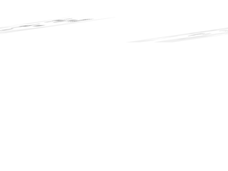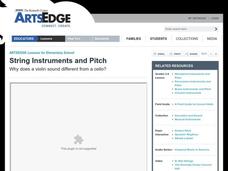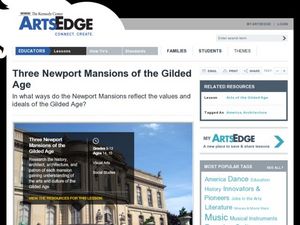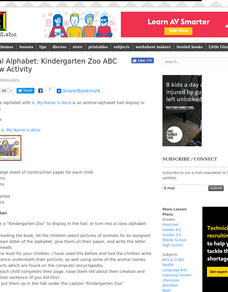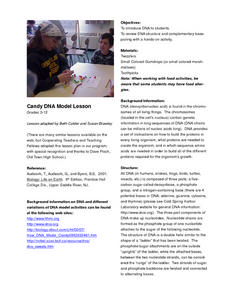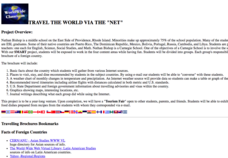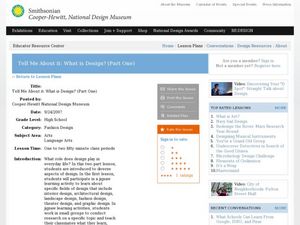Curated OER
Types of Travel and Tourism
Eleventh graders define and consider the traits of different types of travel and tourism such as: eco-tourism, pilgrimages, business travel, etc.) students create a set of criteria for one type of tourism or travel.
Curated OER
The Challenges Ahead
Students examine the physical obstacles that the Lewis and Clark expedition encountered on its journey. They report what challenges these physical obstacles might have posed. They review a modern-day map and explain if the obstacles...
Curated OER
Line Symmetry
Learners investigate the concept of line symmetry and how to recognize it in different contexts. They record the number of symmetries when given problems to work on in class. They review the concept of congruence and how it relates to...
Alabama Learning Exchange
Three in a Row Calendar Game
Students explore a calendar. In this calendar and math instructional activity, students view a video clip about using a calendar. Students participate in a game in which a game board is used to identify days of the week, dates, and months.
Curated OER
Lines Composed a Few Miles Above Tintern Abbey
Twelfth graders read lyrics for "My Hometown" and complete a worksheet to identify setting and tone in the song. In this Romanticism lesson, 12th graders read Lines Composed a Few Miles Above Tintern Abbey by Wordsworth and discuss...
Curated OER
Service Learning--A School Violence Prevention Strategy
High schoolers analyze school violence issues. In this service learning instructional activity, students listen to their instructor present a lecture regarding school violence issues. High schoolers examine service projects to prevent...
Curated OER
Algebra/Geometry Institute: Area of Polygons
Students find the area of polygons. In this area of polygons lesson, students find the area of parallelograms, rectangles, squares, and other polygons. They identify each given figure and determine the appropriate formula...
Curated OER
Seahawk Educational & Environmental Discovery Program
Pupils identify and describe local poisonous plant/animals. They compare characteristics of three local ecosystems and describe common plants from different ecosystems; comparing shapes, colors, textures, and measuring sizes.
Curated OER
Tell Me About It: What is Design? Creating a Design Workshop Part 2
Students create a workshop on basic design to introduce the concept to elementary students. In this design workshop instructional activity, students view two videos that provide basic design concepts. After discussing the concepts as a...
Curated OER
Lesson 2, Student and Teacher Behaviors in Science
Students explore ethics. For this science ethics lesson, students examine science lab classroom ethics as they consider various scenarios that encourage authentic student discussion and the formulation of guidelines and principles.
Curated OER
String Instruments and Pitch
Students make predictions and explore how pitch is altered in string instruments. In this acoustic science lesson, students learn the types and parts of string instruments and create their own. They listen to classical music and identify...
Curated OER
Three Newport Mansions of the Gilded Age
Students visit the Newport Mansions. For this Gilded Age lesson, students explore the architecture and design of The Breakers, The Elms, and Marble House. Students create visual presentations that show the artistic features of the homes...
Curated OER
Fielding Fears
Students consider how real the threat of terrorism might be after military operations in Afghanistan and Iraq, and then explore the terrorist attacks of May, 2003.
Curated OER
Animal Alphabet: Kindergarten Zoo
Students explore the letter sounds and read the book, "A, My Name is Alice." They create a page for a class alphabet book or zoo animal display.
Curated OER
Addition and Subtraction in Center Time
First graders use bean bags, dominos, number trains, counters, paper clips, flashcards, beads and more in a variety of centers to practice basic addition and subtraction facts.
Curated OER
Opposites Attract
Students examine the properties of magnets and static electricity. They participate in experiments that demonstrate the behaviors of charged particles, and record their data on a worksheet.
Curated OER
Consumer Product Testing
Eighth graders watch segments of CBS's Street Cents and discuss approaches used on the program. They create standards for various items and learn why they are important to have. They test different fabrics to explore clothing standards.
Curated OER
Candy DNA Model Lesson
Young scholars explore DNA structure using materials such as Twizzlers, small colored gumdrops and/or toothpicks.
Project SMART
Travel the World Via the "Net"
Middle schoolers work together to create a travel brochure of a foreign country of their choice. They use the Internet to research their information. They create graphics showing interesting locations. They write in their journals at the...
Curated OER
Rhythm and Rhyming Long Rope Jumping
Learners discuss the importance of rhythm in rope jumping. They practice turning, then jumping. Students discuss the various types of rhymes. They work in groups for a couple of classes, learners rotate from chart to chart trying out...
Curated OER
Choices! Choices! Choices!
Students explore the Fundamental Counting Principle and tree diagrams. In this secondary mathematics lesson, students choose three pictures of clothing forma a catalog and create as many outfits as possible. Students then use...
Curated OER
Addition and Subtraction in Center Time
First graders complete center activities as they practice their addition and subtraction skills. They listen to Rick Walton's, "How Many, How Many, How Many" before playing games, and completing addition and subtraction worksheets at...
Curated OER
Tell Me About It: What is Design?
High schoolers create and present an original design. In this visual arts lesson plan, students watch a video about design and learn the elements of design. Then high schoolers work in groups to construct and present an original design.
Curated OER
Using Symmetry to Create a Community Quilt
Students create a class "quilt" made of paper. In this hands-on symmetry lesson, students fold paper to create symmetrical figures then work in groups to color quilt patches that will form together to make a symmetrical class quilt.





